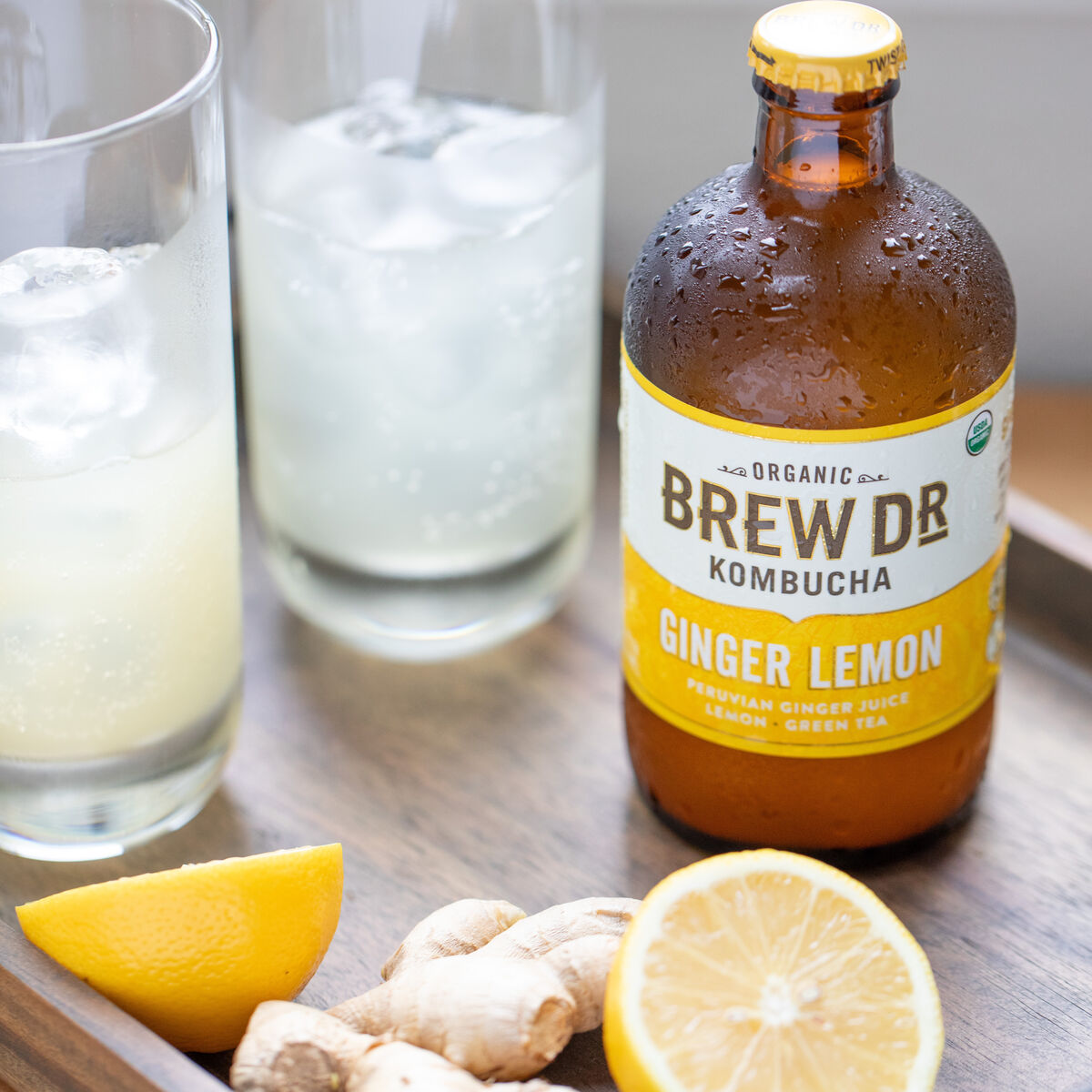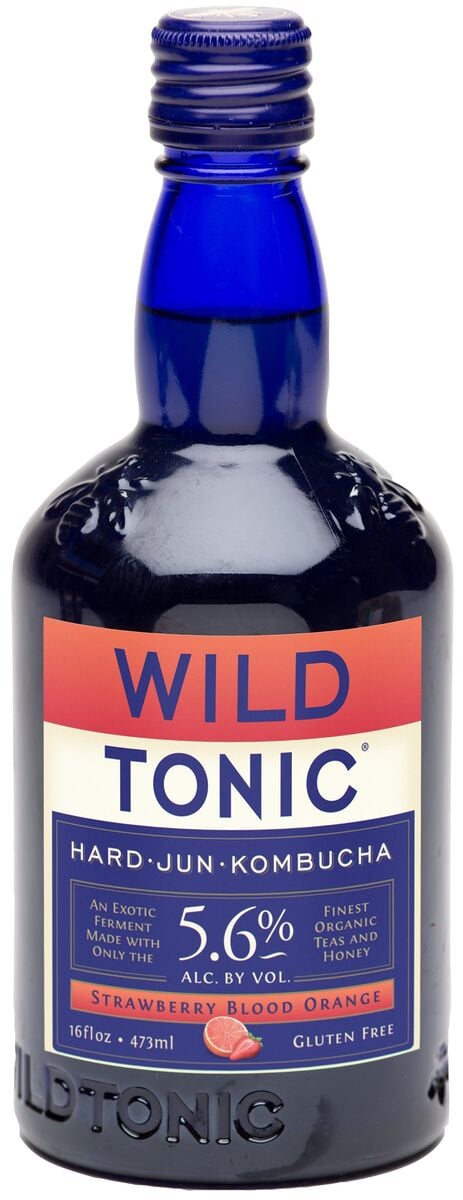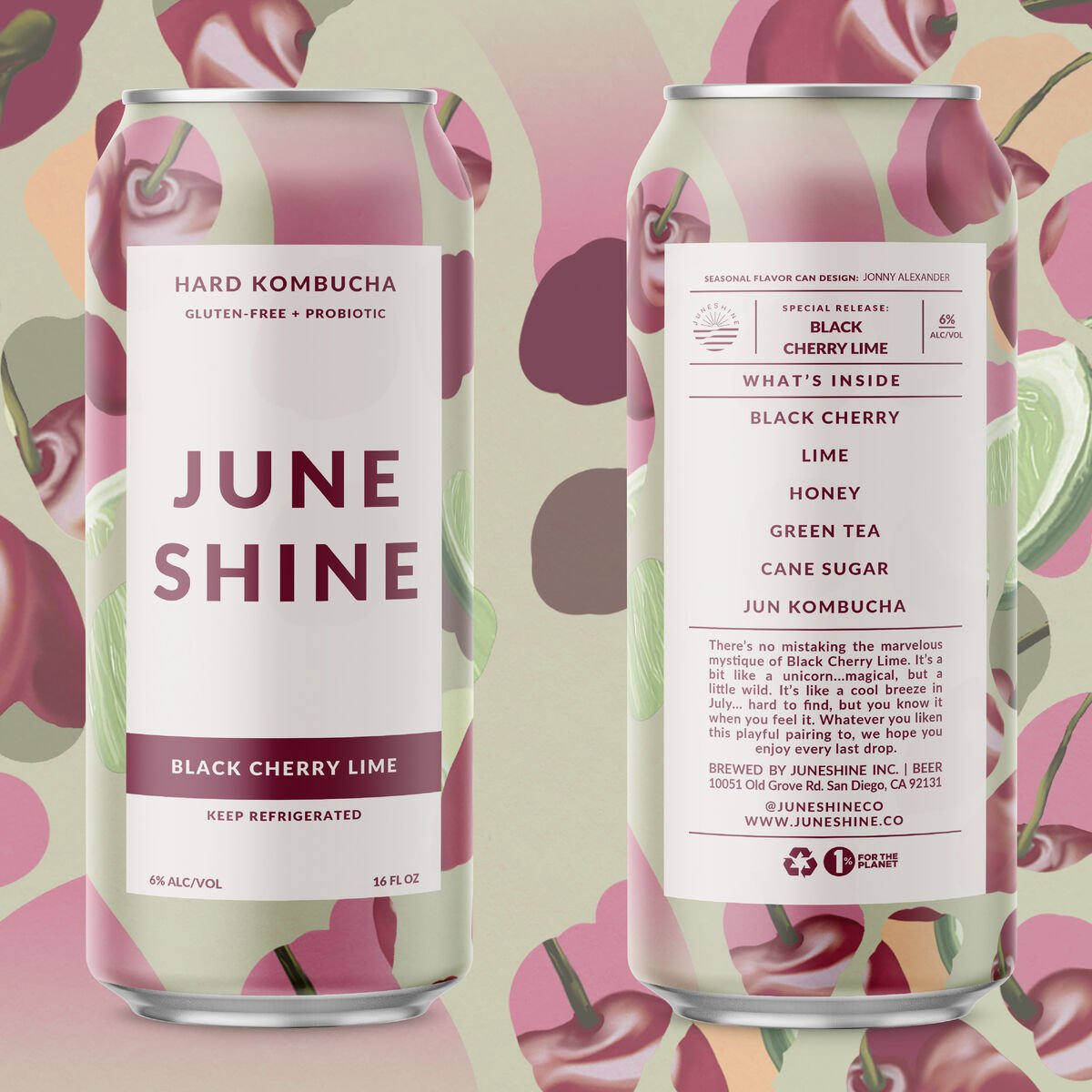Start 14-Day Trial Subscription
*No credit card required

What is Kombucha?
What Is Kombucha, How Is Kombucha Made, Where Did Kombucha Come From& Is KombuchaAlcoholic?
Kombucha is a drink made from a sweetened tea that’s been fermented by a gelatinous colony of yeasts and bacteria. Fortunately for writers like me, this clear definition hides a mysterious beverage with a murky, complex history, as well as a confusing identity. Is it a refreshing health drink? A way of life? A drinkable organism? A guilt-free way to get buzzed? I’ll clarify the murky morass that is booch by exploring its identities, history and modern resurgence.
Where did kombucha come from?
According to Rachel Kanaan, Co-Founder and Formulator of Unity Vibration Kombucha, the beverage kombucha“originated in Asia, then made its way to Russia and around the world through war and trade.” Numerous articles suggest that kombucha originated in Northeast China, (known historically as Manchuria). Health-conscious friends recall drinking it in the U.S. in the 1960s. Alongside other products in the widespread consumer “wellness” trend (yoga pants, herbal supplements, etc.) kombucha rose to prominence gradually throughout the 1990s and early 2000s, and now the category is becoming well-established.
How is kombucha made?
Reid Emmerich, Booch Master at Root Wild Kombucha, was one of the few kombucha makers to break down the technique in great detail: “I basically make a big batch of sweet tea, and cool it down, then I add a culture to it. The culture is from a previous batch, and the part of it you can see is really a substrate (or sub-layer). The big difference, when you brew beer or wine, is that there is not a substrate. With booch, the mixture of substrate and culture is often referred to as a S.C.O.B.Y – a symbiotic culture of bacteria and yeast. It’s a cellulose mat that the acetobacter bacteria creates. On the surface of the S.C.O.B.Y, there is an aerobic environment, but the interior of the culture creates an anaerobic environment beneath it. To be honest – I don’t fully understand it! It’s totally magical. The culture does most of the work – not cleaning the tanks and selling the booch, obviously – but it does all of the fermentation work by itself.”
Every brewer I spoke to agreed - it’s all about the SCOBY! Thomas “Tommy” Weaver, Co-Founder and Brewmaster of Dr. Hops, says that the bacteria and yeast in this gelatinous lump “work together to sustain a low-alcohol and low-PH beverage. The reason it’s called symbiotic is because the yeast (typically a wild form like a Brettanomyces) doesn’t have a strong fermentation ability, so it doesn’t create a lot of alcohol. Just 1-1.5%. Then, these bacteria ferment the alcohol and create some organic acids.”

Is kombucha alcoholic?
As Weaver suggested, most (but not all) kombucha contains some alcohol. Kyla Kombucha CEO Cory Comstock sums it up: “Alcohol is a natural byproduct of the kombucha fermentation process.” Since kombucha exists on the blurry continuum between soft and hard drinks, it challenges the federal regulators and consumers that see beverages as either “hard” or “soft,” with little room in between. Since different varieties of ‘booch have different quantities of booze, we can simplify matters by breaking it down into three categories: Non-alcoholic, "real" and hard.
Non-alcoholic kombucha
My neighborhood grocery store has 10+ varieties of bottled booch, and two on tap, none of which requires an ID to purchase. To be sold without an ID, beverages must have less than a vanishingly small quantity of alcohol - .5% by volume, according to the Federal Alcohol Administration Act.
Savvy readers might note a contradiction here: If kombucha contains alcohol, but I don’t need an ID to buy it, what gives? Emmerch explains that at least part of the issue is a bit of the “wild west” within the emerging booch market: “The whole alcohol thing is challenging. All real kombucha contains alcohol. To claim that commercial versions contain .5% alcohol consistently, is... a stretch. It’s a natural product with variations! I guarantee that if you took a sample of many commercial products and tested them, they would be higher. Certainly, it’s not potent – I give it to my 6-year-old - but it’s not ‘non-alcoholic’ ”
It’s reasonable to assume that at least a few of the brands of kombucha on the shelf actually contain alcohol. But, for the vast majority (especially mass-market brands), in order to meet the federal definition of non-alcoholic, booch brewers must figure out a way to remove the alcohol.
How this is done is subject to both secrecy and scorn. According to Emmerch, “A widely known brand invested like $3 million in a machine to literally strip the alcohol out of their kombucha.” From his tone, it’s obvious that Reid doesn’t see this gleaming, multi-million dollar machine as fitting into his picture of a more organic, funky, not-quite buzzed booch scene, but for mass-market brands, this technology appears to be a necessary evil.
Weaver provides a little more detail: “One way (to not have alcohol) is to not use yeast at all. They might have a proprietary blend of probiotics and might ferment with that. Another way, which is pretty popular is, you make your batch of booch, then you put it in a vacuum, and heat it up to 100 degrees and then the alcohol boils off, so, you’re essentially distilling it. Then, there is the most shady way - which is to just make a beverage, and then toss a probiotic “pill” in it. Some people call it kombucha but…”

“Real” kombucha
Kombucha brewers that are reluctant to tamper with the authenticity of their booch are in an unenviable position: Their drink isn’t strong enough to get a solid buzz, but it meets the Federal definition of an “alcoholic beverage.” Emmerich explains that he’s chosen sides out of necessity.
“We sell it as an alcoholic beverage. We’re licensed as a brewery – and we’re taxed as a brewery, which is certainly a burden, and it makes it harder for retailers – who need a liquor license. We’ve had it tested a few times, and it’s come in around .6, and as high as 1.2%.”
According to Emmerch and others, the Kombucha Brewers Institute is trying to create an “in-between” category for beverages like kombucha that aren’t quite “hard” and aren’t quite soft. They’re lobbying Congress to pass H.R.1089, the so-called Kombucha Act.
Aside from the alcohol, “real kombucha” is chock-full of good bacteria that indie brewers allege is sometimes missing from more refined commercial booch, stripped away by the vacuum distillation that removes the alcohol, or deactivated purposefully to make the beverage shelf-stable.
And, according to many ‘booch brewers, it’s simply an issue of authenticity. Weaver says, “I understand that there are circumstances that require people to have a zero-alchohol beverage. But, if you want the full kombucha experience, in my opinion, you have to have an authentic kombucha that contains a tiny bit of alcohol. It’s just a better experience. I don’t think that has to do with the alcohol, but who knows.”
Speaking from the consumer perspective, though quality might be less consistent (one sample arrived leaking, and covered with a weird slime), the flavors of all the “real” examples I tried were far more vivid than the flavors of the pasteurized or vacuum-distilled kombuchas. There is a lot to be said for a shelf-stable product with consistent flavors, so it appears that kombucha might need to shed some of its authenticity if it is destined to become a mass-market beverage.

Hard kombucha
Where “real” kombucha contains between .5 and 1.5% alcohol by volume, hard kombucha contains between 3% and up to 11% ABV. Hard booch is better viewed as the rowdier older sibling, rather than a different species entirely, since “real” kombucha is already a fermented product that contains more than a trace of alcohol. Many booch brewers find that a higher alcohol product is a natural next step.
According to Rachel and Tarak Kanaan of Unity Vibration, “The fermentation process inspired us to introduce hard kombucha beer in 2011. We think we were the first company to produce it.”
Other booch brewers started down the hard kombucha path in a way familiar to those of us bitten by the brewing bug. Weaver, for example, was “fermenting all sorts of things in jars. I had jars and jars all over the house, and finally, my girlfriend said, essentially, ‘listen, you’d better start making money doing it!’ ….I got interested in kombucha primarily because of how interesting the brewing process is. Hard kombucha is really a new frontier. The whole process is new - what flavors can we do? Can we make a kombucha stout? Can we put chocolate in?”
Regardless of how they started, booch brewers have different tricks to turn up the alcohol production of their kombucha. Kanaan, who makes both “real” and “hard’ booch says, “Our process is different for hard kombucha. We direct the process, and we use specific yeast for specific flavors, and age it as well.”
Weaver gives all the credit to the yeast, in saying, “With us, it’s essentially the addition of brewers yeast. We did it this way because we wanted to achieve a higher level of alcohol without “spiking” or the addition of anything artificial. I keep tanks and tanks of kombucha so I have a steady supply of it, then I pitch it into a sweet tea, and when it's done, I add brewers yeast, and it out-competes the bacteria and ferments it all the way through.”
In addition to being closely related to kombucha, hard booch isn’t a defined style in BJCP sense of the word, either, it’s actually a family of related beverages. In writing and researching this article, I sampled hard, hopped kombucha and Kombucha Rose (Dr. Hops), Bourbon Peach Kombucha (Unity Vibration), Watermelon Basil Sea Salt Kombucha (Flying Embers), and many, many more. All of them were unified by the tart, vinegary flavors of the kombucha base, but they varied widely in sweetness, funk, body, carbonation and essential flavor profile. Jun kombucha, for example, is sweetened with honey, rather than sugar.
Does kombucha have caffeine?
Because kombucha is produced from fermented tea, it often contains some caffeine. Tarak and Rachel say: “Our booch contains between 5-10 milligrams per serving. Most of it is consumed by the SCOBY. We’ve had it tested. It’s about the same amount in a cup of decaf tea or coffee. Everyone has a different process, so, others might have a bit more or less.”
That level of caffeine is certainly consistent with my experience. Kombucha appears to produce a slight lift, but not nearly enough to counteract the alcohol. Some examples, though, like those produced by Brew Dr, are enhanced with added caffeine - and contain up to 130 mg per serving, more caffeine than about a cup and a half of black coffee.

Does kombucha have health benefits?
Kokmbucha branding for all three categories is replete with “elevated lingo.” I’ve seen flavors like “Third Eye Chai,” and a selection of labels that would appear more at home in a head shop or a health food store. Beyond the branding, many booch brewers are enthused about the beneficial effects of it. For Tarak and Rachel, these benefits literally drove the creation of their company. “Rachel was given a SCOBY, because she is a cancer survivor, and kombucha is reputed to help with cancer, and we both started drinking a TON of it,” says Tarak.
Rachel, more direct, says, “I’m not afraid to say that this is good for you! There are studies that document benefits for your health. There are German and Russian studies that show that it shrinks tumors. I feel better drinking kombucha - and that’s because kombucha has probiotics, which benefit gut health. If you have a healthy gut, you have a healthy immune system, and you’re healthier all around.”
Weaver is a little more circumspect, and focuses on the theoretical basis for a benefit: “The whole understanding of the microbiome is in its infancy. We’re noticing correlations between healthy people and the bacteria they host in their guts. There are studies that look at this, and there are some trials that are using lactobacillus as part of mood-regulations. Most of the benefits I see in kombucha are social - it revitalizes the use of fermentation to manufacture healthy foods. It’s the opposite of manufacturing “sterile” food with an infinite shelf life. Kombucha is a MUCH healthier way to scratch that soda itch. It’s low-sugar.”
Fantastic health claims appear common enough so that Memorial Sloan Kettering Cancer Center publishes a web page devoted to the benefits and dangers of kombucha, noting that “Kombucha has not been shown to treat cancer or AIDS in humans,” while also pointing out that “Preclinical studies have shown anti-inflammatory, antioxidant, immunostimulatory, hypolipidemic, and hepatoprotective effects with limited toxicity.”
Weaver points out that booch “doesn’t have many of the carbohydrates or proteins that beer does, so it’s lower in calories.” This, combined with the fact that it’s gluten-free, gives it a leg up in a market that’s increasingly concerned with promoting wellness, even if the specific health claims remain murky.
What does it taste like?
A non-scientific poll of my Facebook friends ranged from the positive (“I LOVE the way it tastes”) to the skeptical (“Drink some vinegar and chase it with something palatable = the same thing?”) to the openly hostile (“You could always gargle with the dirty water that's left sitting in that 4-day-old cereal bowl in the sink to round out the experience”).
In reality, the flavors of kombucha are so different that they are difficult to describe as a coherent whole. Almost all kombucha has a vinegary flavor, and most are subtly sweet, with mild carbonation. The differences in flavor come primarily from the adjuncts - berries, spices, fruits, and other proprietary additives that characterize most booches. I sampled a ghost pepper variant from Urban Farm and Fermentory that lit my belly on fire, and a hopped grapefruit booch from humm that tasted like a NEIPA. My advice is to transcend the labels and try a wide variety of kombuchas whenever you can – cheers!




